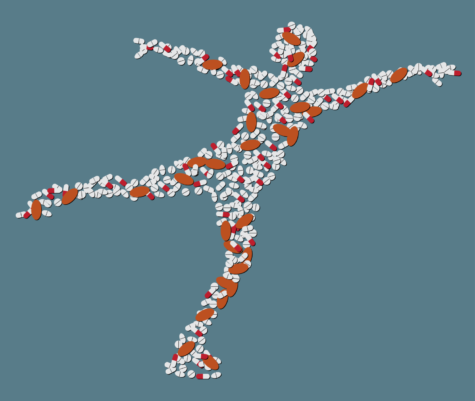From the Basement | Breaking down Russia’s latest figure skating scandal

Russia shocked the world by earning 33 medals at the 2014 Sochi Games. But their victory was overshadowed nearly two years after the end of the Games when the World Anti-Doping Agency accused Russia of a state-sponsored doping program. As a result, WADA issued sanctions against Russia in December 2019, banning Russian teams from competing under the Russian flag in international competition for four years. In 2020, the Court of Arbitration of Sport reduced the sentence timeline, and sanctions against Russia will end on Dec. 16 — or at least, they were supposed to.
Only 10 months out from the end of its ban, Russia finds itself entangled in yet another doping scandal. In case you’re not a figure skating fan like me, ladies gold-medal favorite Kamila Valieva tested positive for trimetazidine, which is — you guessed it — a banned substance.
Trimetazidine is categorized by WADA as a metabolic modulator. Trimetazidine increases blood flow to the heart and limits rapid increases in blood pressure — thus, a big no-no in competition. Valieva’s sample also contained two other heart medications, but only trimetazidine is listed as a banned substance.
Like any good scandal, there are many layers to this story. Let’s talk first about Valieva.
Many hail Valieva as a 15-year-old figure skating phenom. She is the first woman to land a quadruple jump at an Olympic Games and was key in the Russian Olympic Committee’s quest to the gold medal in the team figure skating event.
Valieva provided a sample for testing during the end of December 2021. However, it wasn’t until Feb. 8 that a WADA-accredited lab reported Valieva’s sample as positive for a banned substance. The reason for the six-week delay? Unclear. Either way, Valieva’s positive result triggered an immediate suspension from the Olympics by the Russian Anti-Doping Agency. Her suspension was lifted only one day later following an appeal.
The International Olympic Committee, International Skating Union and WADA challenged RUSADA’s decision to overturn Valieva’s suspension in yet another set of appeals. However, the Court of Arbitration of Sport — the same entity that just shortened Russia’s sanctions from the 2014 Sochi Games’ doping scandal — dismissed the appeals, and Valieva was able to compete in the ladies’ individual skating competition.
Although you may think that one who gets caught doping should obviously not be allowed to compete, Valieva’s case isn’t so simple. Since she is under the age of 16, she is considered a protected person by WADA. This status essentially frees her of any blame in this doping situation.
Who is to blame then?
Most turn to famed-coach Eteri Tutberidze. Tutberidze is known for producing figure skating champion after champion. She trained Yulia Lipnitskaya, Evgenia Medvedeva and Alina Zagitova. All three retired shortly after their championship seasons.
However, other Olympic athletes claim that they are taught at a very young age to be aware of what goes into their bodies. Former Olympic American figure skaters Ashley Wagner and Adam Rippon have both been vocal about the subject.
My first drug test was at 13. From a very early age you are taught that you are responsible for what goes into your body. Even if someone gives you something and tells you to take it, it’s your responsibility to be 100% certain that it’s cleared for your sport.
— Ashley Wagner (@AshWagner2010) February 14, 2022
Regardless of whether Valieva knew what she was doing, this latest doping scandal casts a light on a broken coaching system in Russia. The world was expecting a Russian sweep of the podium — Valieva in first, followed by training mates Anna Shcherbakova and Aleksandra Trusova. But by the end of the free skate, we saw three young women completely collapse under the pressure from the expectations, media coverage and exhausting lifestyle.
Valieva didn’t end up placing on the Olympic podium, a result of some fatal falls in her program. Shcherbakova and Trusova ended up in first and second, respectively, but neither seemed overjoyed at this result. Trusova was disappointed and angry — she is the only one in the trio who has yet to win a gold medal at the senior level.
And while Trusova was in a fit of angry tears, new Olympic champion Shcherbakova was nearly numb — and notably all alone. They say it’s lonely at the top, but it’s also lonely when no one is around to congratulate you on what should be the greatest day of your athletic career. Coaches were too busy consoling Valieva and Trusova to even notice their newest champion.
If Valieva’s tragic doping scandal wasn’t enough to prove to you that Russia’s figure skating system is broken, then the chaos following the final results should be. The adults that should be nurturing Valieva, Shcherbakova and Trusova have instead failed them in so many ways. The quest for gold has overshadowed the livelihood of these young women, and the world watched all three completely collapse as a result.
Many are turning to Tutberidze and investigating her coaching practices even more. Within the figure skating community, Tutberidze has always been a controversial figure, but she is now under the watch glass of a much larger audience. And while the rink is a block of ice, you could say Tutberidze is the coldest thing in the arena.
Your donation will support the student journalists of Tulane University. Your contribution will allow us to purchase equipment and cover our annual website hosting costs.



Zach Schultz • Feb 25, 2022 at 9:36 am
Loved this article! I have read several articles on this subject, and was pleased to see all of the information consolidated in one place. And you are quite right, Tutberidze is quite cold.